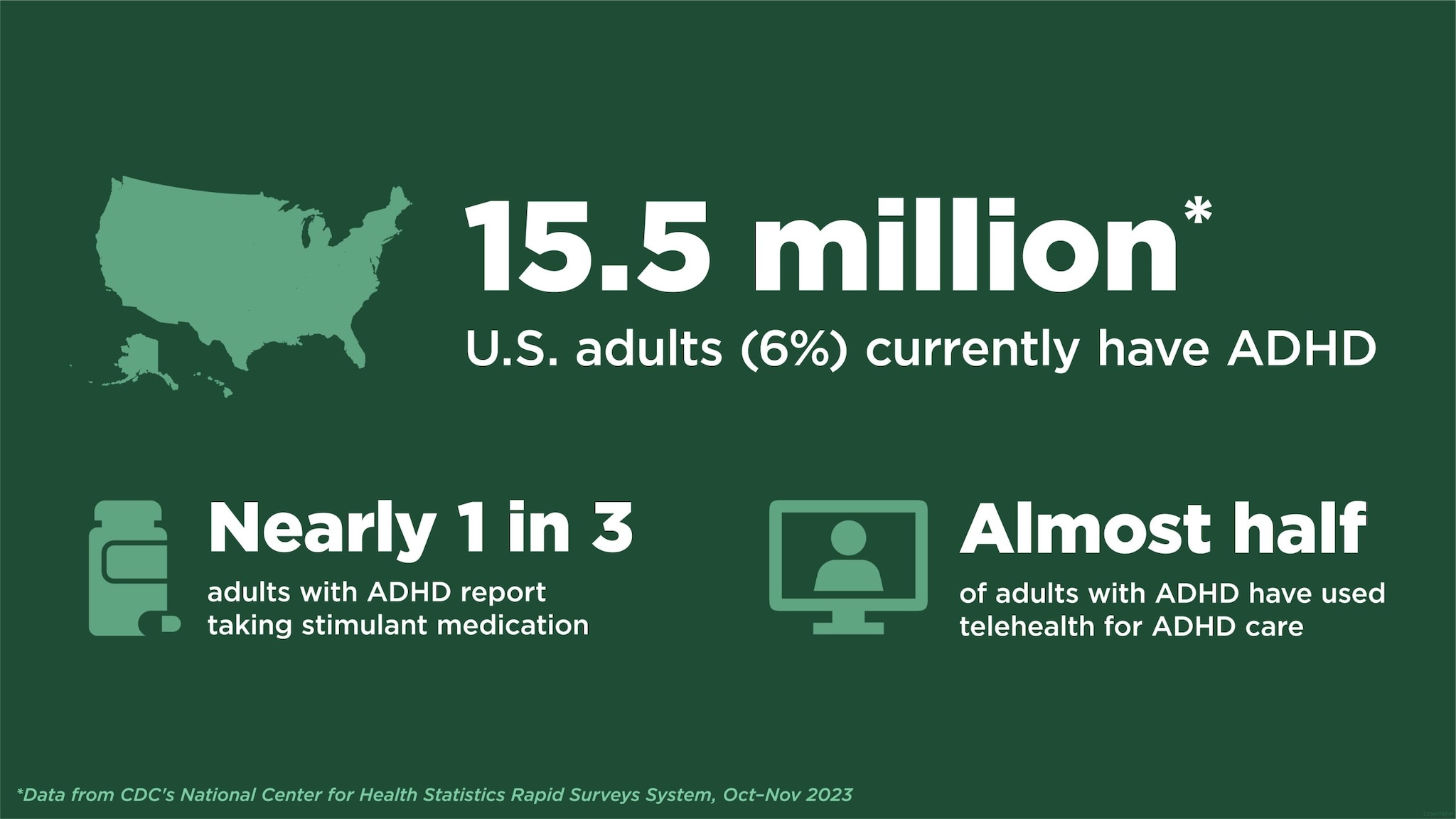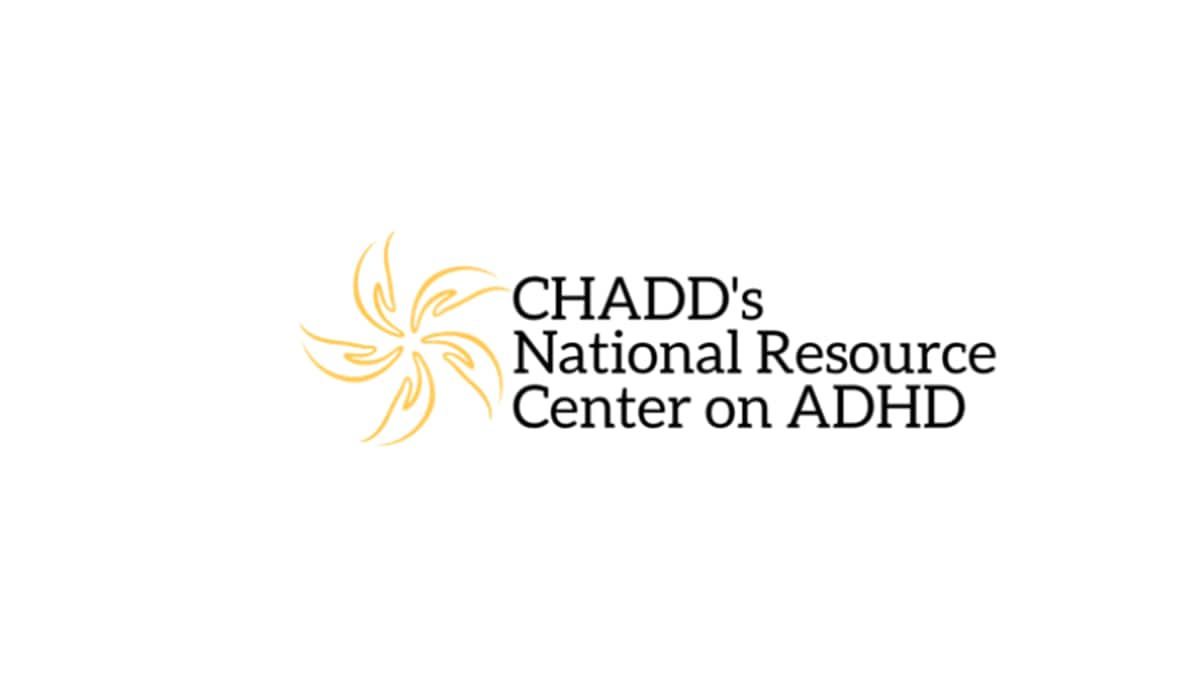At a glance
- Public health professionals and healthcare providers can use national data on ADHD to gain a better understanding of ADHD diagnosis and treatment patterns among adults.
- Information on ADHD can also be used by policymakers to help inform clinical guidelines and develop strategies to address late diagnoses and medication shortages as well as highlight the role of telehealth in ADHD care.
- ADHD can look different in adults than it does in children.
- People access their ADHD care in different ways.
- CDC collects data on ADHD in adults and works with partners to improve the lives of people with ADHD.

Data on ADHD in adults
National data on ADHD among U.S. adults12

Additional findings1
- More than half of adults with ADHD were diagnosed in adulthood.
- Among adults taking stimulant medication, a majority (71.5%) reported difficulty getting their prescriptions filled due to lack of availability.
- However, about one-third of adults are not receiving any type of ADHD treatment.
Data for ACTION
• Public health professionals and healthcare providers can use national data to gain a better understanding of ADHD diagnosis and treatment patterns among U.S. adults.
• Policymakers can use information on diagnosis and treatment to help inform clinical care guidelines, develop strategies to address late diagnoses and medication shortages and highlight the role of telehealth in ADHD care.
CDC's latest data on ADHD in adults
Commentary
Journal of Clinical Psychiatry3
STAT News 4
What to know about ADHD in adults
While it is normal to sometimes have trouble focusing or to feel a bit restless, for people with ADHD, such problems can be severe and last over time. In adults, ADHD can cause difficulty at work and with relationships. ADHD may also make it difficult to keep healthy habits and avoid health risks.

What to look for
ADHD can look different in adults than it does in children. Find out more about ADHD diagnosis and treatment in adults.
Where people access their ADHD care
An ADHD diagnosis can be made by a mental health professional, like a psychiatrist or psychologist, or by a primary care provider, like a family medicine doctor or nurse practitioner.

ADHD care providers and treatment services
Outpatient clinical care
Healthcare claims data from Medicaid or employer-sponsored insurance plans (also known as private insurance) show that2
- Primary care physicians, such as family practice and internal medicine doctors, are the main source of care for adults with ADHD.
- Nurse practitioners and psychiatric nurses also provide ADHD care to adults, providing care for nearly 3 in 10 adults with Medicaid.
- About 1 in 4 adults with private insurance receive ADHD care from a psychiatrist.
Telehealth services
ADHD care can also be delivered through telehealth. Telehealth involves healthcare delivery and education over a distance using electronic and telecommunication technologies. Currently, telehealth can be delivered in several different ways.
- Many adults use telehealth services to access ADHD care.12
- Telehealth may help access to treatment by reducing barriers to care such as transportation, time, and provider availability.5
For more information about diagnosis and treatment of ADHD throughout the lifespan, visit websites for the National Institute of Mental Health and the National Resource Center on ADHD (NRC), a program of CHADD–Children and Adults with Attention-Deficit/Hyperactivity Disorder.
What CDC is doing
CDC supports the health and well-being of adults with ADHD or who may be seeking care for ADHD related symptoms by helping to provide the most current and accurate information.
CDC is collecting data
CDC is developing questions related to ADHD in adults that will be added to national surveys to help us learn more about how many adults have an ADHD diagnosis, what other types of mental and physical health conditions they may have, and what treatments they may receive. CDC's National Center on Health Statistics is also able to provide timely data on ADHD through its Rapid Surveys System.
CDC is working with partners
CDC funds the National Resource Center on ADHD (NRC), a program of CHADD–Children and Adults with Attention-Deficit/Hyperactivity Disorder. Their website has links to information for people with ADHD and their families.
The NRC operates a call center (1-866-200-8098) with trained staff to answer questions about ADHD.

- Staley BS, Robinson LR, Claussen AH, et al. Attention-Deficit/Hyperactivity Disorder Diagnosis, Treatment and Telehealth Use in Adults — National Center for Health Statistics Rapid Surveys System, United States, October – November 2023. MMWR Morb Mortal Wkly Rep 2024;73:890-895.
- Danielson ML, Claussen AH, Arifkhanova A, Gonzalez MG, Surman C. Who Provides Outpatient Clinical Care for Adults With ADHD? Analysis of Healthcare Claims by Types of Providers Among Private Insurance and Medicaid Enrollees, 2021. J Atten Disord. 2024;28(8):1225-1235.
- Mattingly G, Childress A. Clinical implications of attention-deficit/hyperactivity disorder in adults: What new data on diagnostic trends, treatment barriers, and telehealth utilization tell us. J Clin Psychiatry. 2024;85(4):24com15592.
- Didier J. My four kids and I all have ADHD. We need telehealth options. STAT News. Published October 10, 2024. Accessed October 10, 2024. https://www.statnews.com/2024/10/10/adhd-medication-shortage-telehealth-dea-congress/.
- Hong J, Mattingly GW, Carbray JA, et al. Expert consensus statement for telepsychiatry and attention-deficit hyperactivity disorder. CNS Spectr. Published online May 20, 2024.


